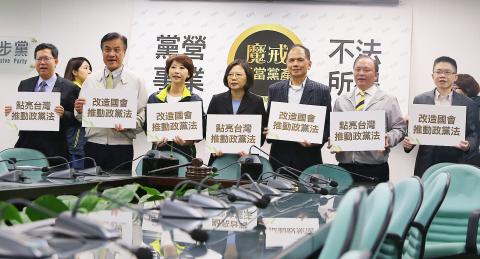The Democratic Progressive Party’s (DPP) Central Standing Committee yesterday adopted a resolution aimed at regulating political party assets, while prohibiting parties to run businesses, specifically targeting the Chinese Nationalist Party (KMT).
“The issue of party assets is not only something concerning the nation’s transitional justice, it would also damage democracy in Taiwan, as it creates unfair competition,” DPP Chairperson and presidential candidate Tsai Ing-wen (蔡英文) told a news conference following the committee’s meeting in Taipei.
“After the next legislature is inaugurated, the DPP will seek to cooperate with all parties to pass a [proposed] political party act, which would define a political party as a non-profit organization, limiting its sources of funding to membership fees, political donations made according to the law, government subsidies and interest thereof,” she added.

Photo: CNA
Tsai said party-run businesses are the “cancer of democracy,” adding that they should be strictly prohibited.
“Although the KMT says that it has put all of its party assets into trust, it is still able to profit from interests via operations and handling of [companies’] assets, leading to unfair competition among political parties,” she said.
In addition to prohibiting political parties from running businesses, Tsai said that there should also be a law to address illegitimate party assets.
“I would like to call on [KMT chairman] Eric Chu [朱立倫] to cease selling off KMT assets,” Tsai said. “As for business leaders, I would like to urge them to not be involved in transactions concerning KMT assets based on corporate social responsibility and ethics, to avoid being trapped in disputes in the future.”
One of the richest political parties in the world, the KMT controversially obtained many of its party assets after taking over properties left by the Japanese after World War II, although the properties should be owned by the government, not a political party.

AGING: As of last month, people aged 65 or older accounted for 20.06 percent of the total population and the number of couples who got married fell by 18,685 from 2024 Taiwan has surpassed South Korea as the country least willing to have children, with an annual crude birthrate of 4.62 per 1,000 people, Ministry of the Interior data showed yesterday. The nation was previously ranked the second-lowest country in terms of total fertility rate, or the average number of children a woman has in her lifetime. However, South Korea’s fertility rate began to recover from 2023, with total fertility rate rising from 0.72 and estimated to reach 0.82 to 0.85 by last year, and the crude birthrate projected at 6.7 per 1,000 people. Japan’s crude birthrate was projected to fall below six,

US President Donald Trump in an interview with the New York Times published on Thursday said that “it’s up to” Chinese President Xi Jinping (習近平) what China does on Taiwan, but that he would be “very unhappy” with a change in the “status quo.” “He [Xi] considers it to be a part of China, and that’s up to him what he’s going to be doing, but I’ve expressed to him that I would be very unhappy if he did that, and I don’t think he’ll do that. I hope he doesn’t do that,” Trump said. Trump made the comments in the context

SELF-DEFENSE: Tokyo has accelerated its spending goal and its defense minister said the nation needs to discuss whether it should develop nuclear-powered submarines China is ramping up objections to what it sees as Japan’s desire to acquire nuclear weapons, despite Tokyo’s longstanding renunciation of such arms, deepening another fissure in the two neighbors’ increasingly tense ties. In what appears to be a concerted effort, China’s foreign and defense ministries issued statements on Thursday condemning alleged remilitarism efforts by Tokyo. The remarks came as two of the country’s top think tanks jointly issued a 29-page report framing actions by “right-wing forces” in Japan as posing a “serious threat” to world peace. While that report did not define “right-wing forces,” the Chinese Ministry of Foreign Affairs was

PREPAREDNESS: Given the difficulty of importing ammunition during wartime, the Ministry of National Defense said it would prioritize ‘coproduction’ partnerships A newly formed unit of the Marine Corps tasked with land-based security operations has recently replaced its aging, domestically produced rifles with more advanced, US-made M4A1 rifles, a source said yesterday. The unnamed source familiar with the matter said the First Security Battalion of the Marine Corps’ Air Defense and Base Guard Group has replaced its older T65K2 rifles, which have been in service since the late 1980s, with the newly received M4A1s. The source did not say exactly when the upgrade took place or how many M4A1s were issued to the battalion. The confirmation came after Chinese-language media reported